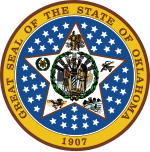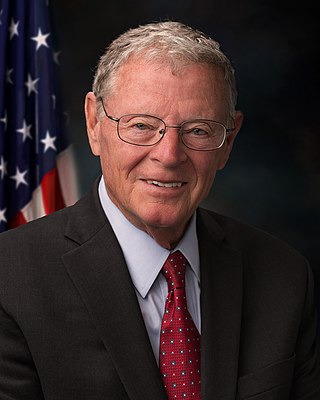
James Mountain Inhofe is a retired American politician who served as a United States senator from Oklahoma from 1994 to 2023. A member of the Republican Party, he is the longest serving U.S. senator from Oklahoma. He served in various elected offices in the state of Oklahoma for nearly sixty years, between 1966 and 2023.

The 1996 United States Senate elections were held on November 5, with the 33 seats of Class 2 contested in regular elections. Special elections were also held to fill vacancies. They coincided with the presidential election of the same year, in which Democrat Bill Clinton was re-elected president.
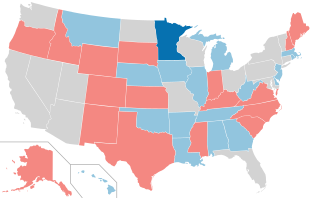
The 1990 United States Senate elections were held on Tuesday, November 6, 1990, with the 33 seats of Class 2 contested in regular elections. Special elections were also held to fill vacancies. The Democratic Party increased its majority with a net gain of one seat from the Republican Party. The election took place in the middle of President George H. W. Bush's term, and, as with most other midterm elections, the party not holding the presidency gained seats in Congress.

The 1980 United States Senate elections were held on November 4, coinciding with Ronald Reagan's victory in the presidential election. The 34 Senate seats of Class 3 were contested in regular elections. Reagan's large margin of victory over incumbent Jimmy Carter gave a huge boost to Republican Senate candidates, allowing them to flip 12 Democratic seats and win control of the chamber for the first time since the end of the 83rd Congress in January 1955.

The 1978 United States Senate elections were held on November 7, in the middle of Democratic President Jimmy Carter's term. The 33 seats of Class 2 were contested in regular elections. Special elections were also held to fill vacancies. Thirteen seats changed hands between parties, resulting in a net gain of three seats for the Republicans. Democrats nevertheless retained a 58–41 majority.

The 1964 United States Senate elections were held on November 3. The 33 seats of Class 1 were contested in regular elections. Special elections were also held to fill vacancies. They coincided with the election of President Lyndon B. Johnson by an overwhelming majority, to a full term. His Democratic Party picked up a net two seats from the Republicans. As of 2022, this was the last time either party has had a two-thirds majority in the Senate, which would have hypothetically allowed the Senate Democrats to override a veto, propose constitutional amendments, or convict and expel certain officials without any votes from Senate Republicans. In practice, however, internal divisions effectively prevented the Democrats from doing so. The Senate election coincided with Democratic gains in the House in the same year.

George Patterson Nigh is an American politician and civic leader from the U.S. state of Oklahoma. Nigh served as the 17th and the 22nd governor of Oklahoma and as the eighth and tenth lieutenant governor of Oklahoma. He was the first Oklahoma governor to be re-elected and the first to win all 77 counties in the state. Additionally, short term vacancies in the governor's office twice resulted in Nigh assuming gubernatorial duties while serving as lieutenant governor.
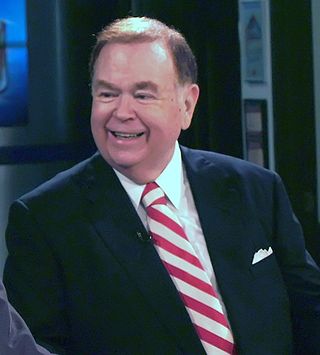
David Lyle Boren is a retired American lawyer and politician from Oklahoma. A member of the Democratic Party, he served as 21st governor of Oklahoma from 1975 to 1979 and three terms in the United States Senate from 1979 to 1994. A conservative Democrat, to date, he is the last in his party to have served as U.S. Senator from Oklahoma. He was the 13th and second-longest serving president of the University of Oklahoma from 1994 to 2018. He was the longest serving chairman of the Senate Select Committee on Intelligence. On September 20, 2017, Boren officially announced his retirement as president of the University of Oklahoma, effective June 30, 2018.
Eugene E. "Gene" Stipe was an American politician from Oklahoma. He was a member of the Democratic Party.

The 2004 United States Senate election in Oklahoma took place on November 2, 2004. The election was concurrent with elections to the United States House of Representatives and the presidential election. Incumbent Republican U.S. Senator Don Nickles decided to retire instead of seeking a fifth term. Republican nominee Tom Coburn won the open seat.
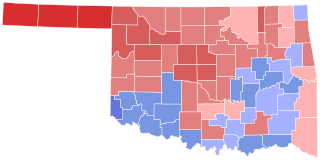
The 1994 United States Senate special election in Oklahoma was held November 8, 1994. Incumbent Democratic U.S. Senator David Boren decided to resign his position to accept the position as president of the University of Oklahoma, which prompted a special election. Republican Jim Inhofe won the open seat.

The 2014 Oklahoma gubernatorial election was held on November 4, 2014, to elect the governor of Oklahoma. Incumbent Republican Governor Mary Fallin was re-elected over Democratic state representative Joe Dorman.

The 2016 United States Senate election in Oklahoma was held November 8, 2016 to elect a member of the United States Senate to represent the State of Oklahoma, concurrently with the 2016 U.S. presidential election, as well as other elections to the United States Senate in other states and elections to the United States House of Representatives and various state and local elections. The primaries were held June 28.

The 2014 United States House of Representatives elections in Oklahoma were held on Tuesday, November 4, 2014, to elect the five U.S. representatives from the state of Oklahoma, one from each of the state's five congressional districts. The elections coincided with other elections to the United States Senate and House of Representatives and various state and local elections, including the Governor of Oklahoma and both of Oklahoma's United States Senate seats. Primary elections were held on June 24, 2014. Primary runoffs were held on August 26, 2014, in contests where no candidate won more than 50% of the vote.
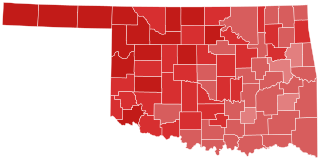
The 2014 United States Senate special election in Oklahoma took place on November 4, 2014, to elect a member of the United States Senate to represent the State of Oklahoma, concurrently with the regularly-scheduled election to Oklahoma's other Senate seat, as well as other elections to the United States Senate in other states and elections to the United States House of Representatives and various state and local elections.

The 2018 Oklahoma gubernatorial election was held on November 6, 2018. Republican businessman Kevin Stitt was elected the governor of the state, succeeding fellow Republican Mary Fallin, who was term-limited. Primary elections occurred on June 26, 2018, with primary runoff elections having occurred on August 28, 2018.

The 1962 United States Senate election in Oklahoma took place on November 6, 1962. Incumbent Democratic Senator Mike Monroney was re-elected to a third term. After winning a sizable victory in the Democratic primary, Monroney faced Republican former U.S. Attorney B. Hayden Crawford in the general election. Monroney won his last term in the Senate before his defeat in 1968. This election marks the last time a Democrat won the class 3 senate seat from Oklahoma.

The 1964 United States Senate election in Oklahoma took place on November 3, 1964. Democratic Senator Robert S. Kerr, who won re-election to his third term in 1960, died in office on January 1, 1963. Governor J. Howard Edmondson resigned from office so that his Lieutenant Governor, George Nigh, could appoint him to the U.S. Senate. Edmondson ran for re-election in the ensuing special election, and faced strong competition from former Governor Raymond D. Gary and State Senator Fred R. Harris. Edmondson placed first in the primary, but failed to win a majority, with Harris narrowly beating out Gary for second place. In the runoff, Harris defeated Edmondson in a landslide. In the general election, Harris faced former Oklahoma Sooners football coach Bud Wilkinson, the Republican nominee. Even though President Lyndon B. Johnson won Oklahoma by a wide margin over Republican presidential nominee Barry Goldwater, the Senate race was much closer. Ultimately, Harris only narrowly defeated Wilkinson by just 2% of the vote.

The 1984 United States Senate election in Oklahoma was held on November 6, 1984.

The 2022 United States Senate special election in Oklahoma was held on November 8, 2022, to elect a member of the United States Senate for Oklahoma. The election took place concurrently with the regularly scheduled election for Oklahoma's other Senate seat. The candidate filing deadline was between April 13–15, 2022.

